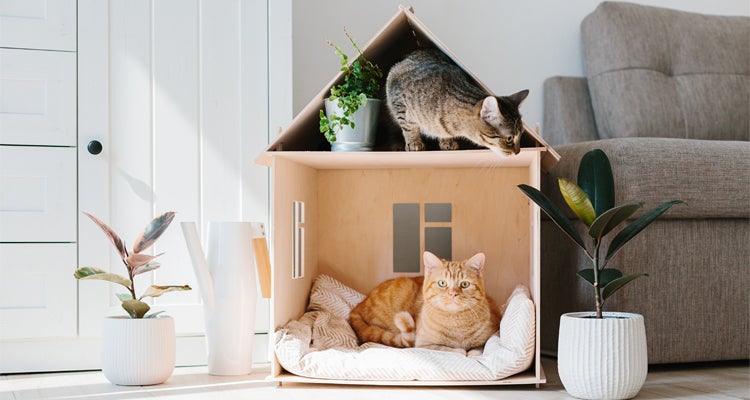
Table of Contents
- Reasons your cat may be meowing
- Medical Issues
- Attention Seeking
- Hunger
- Greeting Behavior
- Stress or Anxiety
- Age-Related Confusion
- Mating Behavior
- Different Types of Cat Meows
- When to Consult a Vet
- Conclusion
- FAQs
As a cat parent, you will be familiar with the sound of your kitty meowing – and you’ve almost certainly asked yourself the question: “why is my cat meowing?”
After all, who could resist wanting to know what their feline friend is thinking as they meow plaintively early in the morning, or whilst weaving through your legs and whining continuously.
From ‘’Hello!’’ to hunger, we look at the circumstances in which your cat meows or vocalises to help you understand your resident feline a little better. Understanding why cats purr is another important aspect of feline communication that can help you better connect with your pet.
Reasons your cat may be meowing
While kittens meow to let their mother know they're cold or hungry, adult cats don’t actually meow at each other, just at people. Let's discuss the 7 common reasons, Why Do Cats Meow?
7 Common Reasons Your Cat Meows Constantly & Effective Solutions
1. Medical Issues
A medical issue may be indicated if your cat begins meowing more frequently than normal or makes distressed noises. Increased vocalisation is frequently a symptom of conditions like kidney disease, hyperthyroidism, or urinary tract problems. This is a classic sign of a cat meowing due to illness.
When to Take a Cat to Vet
- Look for sudden changes in meowing behavior.
- Watch for symptoms like lethargy, vomiting, or weight loss.
- Always get advice from a veterinarian when a cat's behaviour changes or gets worse.
2. Attention seeking
Cats are known to be independent, but they frequently meow to get attention. Requests for playtime, pet attention, or simply some interaction can fall under this category. When you're concentrating on something else, like your phone or work, you might notice that your cat meows more.
Solution
- Set aside specific, regular playtimes each day. Attention-seeking meows can be considerably reduced by using interactive toys for even ten to fifteen minutes a few times a day.
- To keep them engaged both mentally and physically, even when you're busy, provide them a range of interactive toys, such as puzzle feeders, laser pointers, and wand toys.
- Important: To prevent reinforcing the behaviour, consistently ignore attention-seeking meows (if they are not urgent). Patience is needed for this, but rewarding quiet behaviour instead will teach them that quiet behaviour is rewarded.
3. Hunger
Around mealtime, your cat may start meowing louder and more persistently. Because they are habitual, cats will not hesitate to alert you when their bowl is empty. Meowing for food or treats is a common behaviour for cats.
Solution
- Set up a regular feeding schedule and follow it. Cats love consistency and routine.
- To cut down on early morning meows, think about getting an automatic feeder that will dispense food at predetermined times.
- To promote hydration, make sure there is always access to fresh, clean water by setting up several bowls in various places or a cat water fountain.
4. Greeting
Some cats greet their humans by meowing. A quick or repeated meow can be their way of greeting you, whether you've just entered a room or returned home. This is typical and usually not a cause for concern.
Solution
- Respond to their greeting: Give them a quick moment of attention, a gentle 'hello,' or a gentle pet in return.
- Interact briefly: A brief exchange of words strengthens the constructive dialogue without promoting excessive attention-seeking meowing.
- Keep an eye on the context: Take note of whether the greeting meows are becoming more intense or demanding, as this could point to another underlying cause.
5. Stress or Anxiety
A cat meowing due to stress could be a response to a change in routine, like adjusting to a new home, or mourning a lost friend. Your cat may become more talkative under stress, particularly if they are attempting to reassure you.
How to Help
- Determine the source of the stress (new pet, relocation, loud noises, etc.).
- Create a peaceful, secure environment.
- Think about additional playtime or pheromone diffusers.
6. Ageing
Cognitive dysfunction in older cats can cause confusion or anxiety, which can result in loud, sporadic meowing, usually at night. This is often called 'cat meowing at night' because of ageing.
Solution
- To keep your senior cat comfortable and less confused, stick to a regular schedule.
- Give confused cats nightlights so they can safely navigate their surroundings, especially at night.
- Consult your vet for potential medications, supplements, or dietary changes that can support cognitive health and manage symptoms associated with aging.
7. Wanting to breed
Your cat may be meowing excessively because of mating instincts if they haven't been spayed or neutered. Males yowl when they detect a mate nearby, and females yowl when they are in heat. Meowing to mate is a common vocalisation made by cats.
Solution
Spaying or neutering: We strongly recommend spaying (for females) or neutering (for males) as the best, most responsible, and permanent way to stop heat cycles and the behaviours that go with them, stop unwanted pregnancies, and make both male and female cats behave better.
Different meows mean different things
There are many different meows that cats can use varying in length, pitch and volume.
Generally, the following meows have these meanings:
| Type of Meow | Likely Meaning |
| Short meow | A simple “hello” |
| Multiple meows | Excitement, often a greeting |
| Mid-pitch meow | Request for food |
| Drawn-out “mrrroooow” | Demand, like “open the door” |
| Low-pitch “MRRRooooowww” | Complaint, possibly frustration |
| High-pitched “RRRROWW!” | Pain or anger, often from injury |
While there are many reasons your feline resident could be meowing, you will know as a cat parent that sometimes your cat meows for no apparent reason.
Paying attention to the circumstances in which your cat meows or vocalises, and the sounds they make, will help you better understand your furry companion.
When to Consult a Vet
While knowing why your cat meows can help you deal with a lot of problems at home, it's important to know when to get professional veterinary assistance. Your cat's health may suffer if you ignore persistent or unusual vocalisations.
Signs That Warrant a Vet Visit
- Meowing occurs more frequently, louder, or at strange times.
- Your cat exhibits additional symptoms, such as changes in appetite and lethargy.
- The behavior's cause is unclear.
Conclusion
The way your cat communicates with you is through meowing. Every meow has a purpose, whether it's to greet someone, express stress, hunger, or illness. You can better understand your cat's communication and provide for their needs by paying attention to the frequency, tone, and timing of their vocalisations.
If the behaviour is unusual, frequent, or accompanied by additional symptoms, always get advice from a veterinarian.
FAQ
1. Why is my cat meowing so much suddenly?
Unexpectedly high meowing could be a sign of stress, health problems, or a change in surroundings. See a veterinarian and keep an eye out for any new symptoms.
2. How do I stop my cat from meowing excessively?
Determine the cause first, such as hunger, boredom, sickness, etc. Attend to their needs, keep a schedule, and refrain from rewarding undesirable behaviour.
3. Do cats meow to communicate with other cats?
While adult cats usually save meowing for human communication, kittens meow at their moms.
4. Why does my cat meow at night?
Meowing at night may be caused by cognitive decline, loneliness, hunger, or ageing. Look for triggers and talk to your veterinarian about them.
5. Should I ignore my cat’s meowing?
Not all the time. Find the cause first; neglecting a legitimate need or medical condition can have negative consequences. Think about redirection if it's just for attention.












